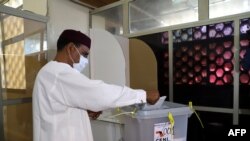Niger voted in long-delayed municipal and regional elections Sunday, the day after an attack by the Boko Haram jihadist group claimed at least 27 lives, according to local officials, and two weeks ahead of a landmark presidential election.
The vote had been postponed repeatedly because of jihadist attacks in parts of the poor Sahel country, notably in the southeastern Diffa region where Saturday's assault occurred.
Many parts of the west and southeast have suffered attacks since 2015, preventing people from registering to vote, according to the national electoral commission, CENI.
A senior local official said Saturday's attack left 27 dead and was of "unprecedented savagery," with dozens of assailants laying to waste 60% of the town of Toumour, burning down as many as 1,000 homes and the central market.
He blamed the attack on Boko Haram, though officials typically make no distinction between Boko Haram and a splinter group, the Islamic State West Africa Province (ISWAP), when referring to the jihadists.
Diffa's governor, Issa Lemine, went to Toumour to attend the victims' burials on Sunday.
An official of the Bosso region that includes Toumour said the elections did not go ahead there Sunday.
After polling ended, the electoral body CENI said that the voting had gone well overall and that the results would be collated in Niamey after counting.
The Diffa region is home to 120,000 refugees from neighboring Nigeria as well as 110,000 people internally displaced within Niger, according to the U.N.
Niger also suffers jihadist attacks in the west on its borders with Mali and Burkina Faso.
Niger, along with Chad and Cameroon, is struggling with a jihadist campaign that Boko Haram launched in northeastern Nigeria in 2009 and then took into the wider Lake Chad region.
More than 36,000 people, most of them in Nigeria, have been killed and about 3 million have fled their homes since Boko Haram launched its insurgency, according to U.N. figures.
The four countries have formed a regional military coalition to fight the jihadists, who use the lake's marshland, dotted with islands, as a refuge.
Niger also contributes to the French-led Operation Barkhane, set up in 2014 with some 5,000 French troops, based in Chad.
First peaceful power transfer
Some 7.4 million people were eligible to vote in Niger's 266 municipalities on Sunday, with the ruling Nigerien Party for Democracy and Socialism (PNDS) the overwhelming favorite.
The PNDS's presidential candidate, Mohamed Bazoum, is the runaway front-runner in the December 27 ballot, which the incumbent, Mahamadou Issoufou, will not contest because his two terms are up.
Issoufou, who was elected in 2011 and 2016, has won praise for his decision to step aside for a successor, unlike some counterparts on the African continent who have pushed through constitutional changes in order to extend their presidencies.
The election should mark the first peaceful transfer of power in the history of the coup-prone former French colony.
Bazoum, 60, a former interior and foreign minister under Issoufou, is among 30 candidates in the race.
Last month, Niger's constitutional court blocked main opposition leader Hama Amadou, 70, from running because of a 2017 conviction for baby-smuggling, a case he claimed was politically motivated.




